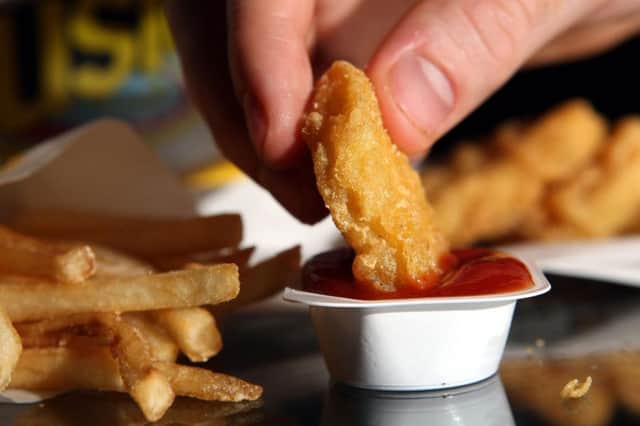JUNK FOOD ADDICTION AND THE FIVE INGREDIENT RULE


I got a fish supper from a nearby chip shop because I was too tired to cook.
This morning, I was late going on the school run. I missed breakfast and ended up eating a packet of raspberry ruffles on the way home from dropping Junior off.
Advertisement
Hide AdAdvertisement
Hide AdI’d bought them the night before and found them in my bag.
The ruffles were scrumptious, but after about an hour I began to feel really sluggish and tired.
I couldn’t be bothered doing anything and felt clogged up and bloated from the late chippie dinner and the sweet treat breakfast.
The junk food brought me down both in mood and energy levels, but did this send me tearing off in search of fruit or something with huge nutritional value? No! I enjoyed the stodgy food so much the night before, that I wanted to repeat the experience and ended up trekking to a home bakery some distance away, who make their own (and might I add delicious!) sausage rolls. It’s no wonder I’m piling on weight, but it’s not entirely down to a lack of willpower.
Advertisement
Hide AdAdvertisement
Hide AdCutting back on junk food is not easy, we tend to develop cravings for the stuff and even though the rational part of our brain knows it’s bad for us, there’s another part that disagrees, dismisses the health issues and presses us to indulge in our favourite rubbishy treats.
According to food scientist Steven Withelry, who spent 20 years studying what makes certain foods more addictive, there are two factors involved.
First, is the sensation of eating the food, it’s taste and how it feels in the mouth. Food companies spend fortunes to discover the most satisfying levels of crunch in a potato crisp, or the perfect amount of fizz in a drink, it’s understandable how some of us don’t really stand a chance when it comes to saying no to these foods!
The second factor in making junk food addictive, is getting the perfect combination of salt, sugar and fat which excites the brain and starts you craving for more. Junk food stimulates the reward system in the brain in the same way as drugs like cocaine do.
Advertisement
Hide AdAdvertisement
Hide AdFor susceptible people (like me!) eating these kinds of foods can lead to full-blown addiction. Modern junk foods cause a reward response in the brain that is much more powerful than any chemical reaction we might experience from natural foods.
Eating an apple or a piece of steak might cause a moderate release of dopamine (the happy drug) in the brain, but eating something like ice-cream will release a massive amount! I remember quite clearly the first time I tasted a Magnum ice-cream lolly. I almost passed out with pleasure, I kid you not, I experienced what I can only describe as pure ecstasy!
Who in their right mind wouldn’t want to repeat that experience? I haven’t had the same earth shattering sensations with a Magnum since, but it’s not for the want of trying!
Food can undoubtedly be connected to our emotions and moods.
Advertisement
Hide AdAdvertisement
Hide AdIt can make us feel good, but it’s a fleeting sensation. All of my recent stodgy food treats have left me feeling lethargic and a bit down, as they always seem to do afterwards.
It seems it’s nothing new for humans to turn to food for comfort only to find it results in depression.
Ancient Roman poet Horace said; ‘Clogged with yesterday’s excess, the body drags the mind down with it’. Even the Ancient Romans were aware that overindulgence didn’t put you in the best of moods, but then, the rich ancient Romans weren’t exactly followers of the cabbage soup diet!
A tasty meal for them involved stuffing a chicken inside a duck, then the duck inside a goose, the goose inside a pig, then the pig inside the cow. They then cooked the whole lot together!
Advertisement
Hide AdAdvertisement
Hide AdNo doubt after digesting a small farm yard there was a fair bit of toga-loosening going on and old Horace was probably raging with himself the next day for indulging in another beast feast.
One piece of advice on how to avoid heavily processed foods is the five ingredient rule.
The idea is to avoid anything with more than five ingredients in it.